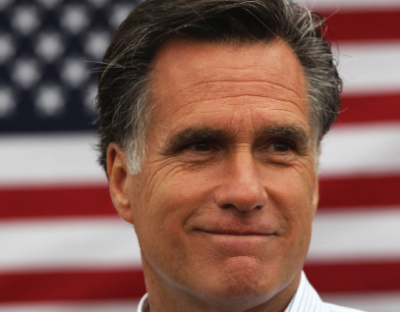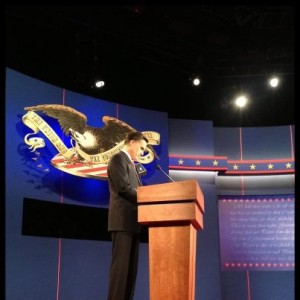Did Romney ‘Win’ the Debate?

The instant analysis after the first presidential debate — even on liberal-leaning MSNBC — was that Mitt Romney was the decisive “winner.” But Romney not only ducked the specifics of his plans but looked sneaky and nervous in doing so, writes Robert Parry.
In the presidential debate that I watched on Wednesday night, Republican challenger Mitt Romney was shiftier than Dick Nixon in 1960 and less coherent than George W. Bush in 2000, but the TV pundits, including on MSNBC, overwhelmingly declared him the winner.
When I tried to follow Romney’s logic, I couldn’t. Somehow the federal government was supposed to rein in rising health care costs but his only idea for doing so was to let the free-market work when it is clear that – whatever the shortcomings of “Obamacare” – the old model of health insurance was broken.
Romney also claimed that his health-insurance plan would cover people with pre-existing conditions and do other positive things that are in the Affordable Care Act, but, as President Barack Obama noted, Romney hasn’t offered a serious explanation as to how that would happen.
Romney treated any reference to his 20 percent across-the-board tax cut costing $5 trillion over decade as a lie, likening the President to his “five boys … saying something that’s not always true but just keep on repeating it.” After all, Romney has declared that his plan would be revenue-neutral. But he continued his pattern of refusing to specify how he would make it so.
In the debate that I saw, Romney seemed to be on the defensive, in large part, due to the incoherence and incompleteness of his arguments. And that reflected itself in his body language. He shifted nervously, blinked rapidly and displayed a forced smile. It looked like he was about to tear up during his closing remarks.
I saw a man struggling at the end of his rope. By contrast, Obama looked, well, presidential. He was never flustered and mounted vigorous defenses of his policies, offering details about what he had done and what he would do. Yet, he didn’t sound overly defensive or whiny, a big risk in such a setting.
One could fault Obama for not being more aggressive with host Jim Lehrer, who curiously seemed determined to stop the President from exceeding his time limit while letting Romney ramble on. But that is more a criticism of Lehrer, who behaved like PBS types often do – they go weak in the knees when a Republican talks about slashing the subsidy for public broadcasting, as Romney pointedly did.
So, I came away from watching the 90-minute debate thinking that Romney had come as close to melting down in front of a huge national audience as anyone I have ever seen in my half century of watching presidential debates. Pundits often fall back on the cliché that “no one landed a knock-out punch,” but this was as close to having one candidate lying on the mat as I have ever seen, although it was mostly Romney doing the damage to himself.
Yet, immediately after the debate – even on liberal-leaning MSNBC – Republican commentators were given the floor and allowed to set the tone of the meeting. On MSNBC, Rachel Maddow deferred to GOP campaign strategist Steve Schmidt, who gushed over Romney’s performance. The verdict was “Romney won.”
Everyone on the set except for Al Sharpton fell in line. Ed Schultz blasted Obama for not lashing out at Romney and especially for not blasting Romney’s portrayal of 47 percent of the U.S. population as irresponsible moochers.
For the past several days, pretty much every pundit I watched had predicted that the “the 47 percent” comment would be the centerpiece of the debate, but I never thought that was likely, having watched Lehrer handle other debates. He almost never goes for the “gotcha” question, favoring bland policy discussions.
Without Lehrer introducing the remark, it would have been difficult and clumsy for Obama to shoehorn the comment in. Frankly, it would have elicited groans from many Americans as an overreach. But the pundits had decided that it had to be at the heart of the debate, so they blamed the President when it wasn’t.
What was particularly startling about the MSNBC commentary was its lack of substance – except for Sharpton, who zeroed in on the discrepancies between Romney’s months of campaign statements as a “severely conservative” ex-governor of Massachusetts and his reinvention of himself as a caring fellow on Wednesday.
Yet, even on style, it was amazing to me that the pundits were favoring Romney, who looked more ill at ease than Nixon did in his infamous 1960 debate debacle with Kennedy and goofier than Bush in 2000, who was so unserious that he elicited a famous “sigh” from Al Gore. Romney wasn’t as much on the offensive all night as he was testy. He talked fast, lacked specifics and nagged Lehrer about getting more time.
If Romney were a car salesman, he would be the one urging me to overlook the car’s lousy mileage and poor repair record and begging me to buy his vehicle so he could meet his quota and not get in trouble with the boss. On Wednesday night, I was a bit worried that he would dissolve into tears during his closing remarks.
His shaky behavior and watery eyes brought to mind Ann Romney’s comment last Thursday that her “biggest concern” about her husband getting elected president “would just be for his mental well-being.” In a TV interview in Nevada, Romney’s wife pronounced him competent and qualified but worried about “the emotional part of it” for her husband.
More on Point
Some of the newspaper commentators more closely represented the debate that I watched. Alessandra Stanley of the New York Times noted that “Mr. Romney managed, despite a dry throat and some rapid blinking, to keep a choirboy smile pasted on his face while Mr. Obama spoke.
“Mr. Obama was quicker to drop his bonhomie and adopt the look of a long-suffering headmaster enduring the excuses of a bright student he is going to expel.”
The Times also did a solid job of assessing the claims and counter-claims from the two rivals. And the Times’ lead editorial took Romney to task for his mendacity and Obama to task for not holding the Republican accountable.
But how to explain the behavior of the TV commentators, especially those on MSNBC, whose instant “spin” on behalf of Romney surely influenced the opinions of millions of Americans in their own assessments of who won?
Though MSNBC has done a relatively good job of creating some balance in a cable TV environment that Fox News has tilted sharply to the right, its hosts are under corporate pressure to present themselves as neutral newscasters in situations like Wednesday’s debate. (Remember the trouble that Keith Olbermann encountered.)
So, aspiring careerists like Rachel Maddow can be expected to demur in a situation like Wednesday night. After all, for her there are grand career opportunities, like a regular gig on NBC’s “Meet the Press” or possibly even replacing David Gregory as the host, a big step indeed.
So she immediately turned to Steve Schmidt, who did what you would expect a Republican political operative to do in such a case. He spun the outcome for Romney and did so with such confidence that he seemed to influence the remarks of MSNBC show anchors, Chris Hayes and Chris Matthews, who promptly fell in line.
For his part, Ed Schultz sounded more like a disgruntled lefty who wanted Obama to be the perfect gladiator mercilessly chopping Romney to pieces and then asking the American TV audience, “are you not entertained?”
But that approach would have opened Obama to another line of attack, the angry black man, a balancing act that Obama instinctively senses but that white liberals don’t seem to get. The only MSNBC anchor cutting through the “Romney won” spin was Sharpton.
While it’s true that Obama could have been tougher in demanding more time from Lehrer and in going after his rival, the President did resist Lehrer’s curious eagerness to impose time limits on Obama but not Romney.
Obama also made the key point about how Romney and his running mate, Rep. Paul Ryan, keep evading specifics on their various plans. Indeed, that was my primary takeaway from the debate, that a shifty and shifting Romney won’t tell the American people what he actually intends to do.
Robert Parry broke many of the Iran-Contra stories in the 1980s for the Associated Press and Newsweek. His latest book, Neck Deep: The Disastrous Presidency of George W. Bush, was written with two of his sons, Sam and Nat, and can be ordered at neckdeepbook.com. His two previous books, Secrecy & Privilege: The Rise of the Bush Dynasty from Watergate to Iraq and Lost History: Contras, Cocaine, the Press & ‘Project Truth’ are also available there.


